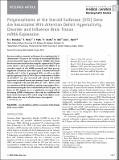Files in this item
Polymorphisms of the steroid sulfatase (STS) gene are associated with attention deficit hyperactivity disorder and influence brain tissue mRNA expression
Item metadata
| dc.contributor.author | Brookes, K | |
| dc.contributor.author | Hawi, Ziarah | |
| dc.contributor.author | Park, J | |
| dc.contributor.author | Scott, S | |
| dc.contributor.author | Gill, M | |
| dc.contributor.author | Kent, Lindsey | |
| dc.date.accessioned | 2011-06-16T15:32:13Z | |
| dc.date.available | 2011-06-16T15:32:13Z | |
| dc.date.issued | 2010-12 | |
| dc.identifier | 2340937 | |
| dc.identifier | acb5465d-afd3-4548-8958-f2dee5055ef3 | |
| dc.identifier | 78851469712 | |
| dc.identifier | 000284623200005 | |
| dc.identifier.citation | Brookes , K , Hawi , Z , Park , J , Scott , S , Gill , M & Kent , L 2010 , ' Polymorphisms of the steroid sulfatase (STS) gene are associated with attention deficit hyperactivity disorder and influence brain tissue mRNA expression ' , American Journal of Medical Genetics. Part B, Neuropsychiatric Genetics , vol. 153B , no. 8 , pp. 1417-1424 . https://doi.org/10.1002/ajmg.b.31120 | en |
| dc.identifier.issn | 1552-4841 | |
| dc.identifier.other | ORCID: /0000-0002-5315-3399/work/60195359 | |
| dc.identifier.uri | https://hdl.handle.net/10023/1867 | |
| dc.description | Supported by Wellcome Trust funding | en |
| dc.description.abstract | Previous studies in animals and humans have implicated the X-chromosome STS gene in the etiology of attentional difficulties and attention deficit hyperactivity disorder (ADHD). This family based association study has fine mapped a region of the STS gene across intron 1 and 2 previously associated with ADHD, in an extended sample of 450 ADHD probands and their parents. Significant association across this region is demonstrated individually with 7 of the 12 genotyped SNPs, as well as an allele specific haplotype of the 12 SNPs. The over transmitted risk allele of rs12861247 was also associated with reduced STS mRNA expression in normal human post-mortem frontal cortex brain tissue compared to the non-risk allele (P = 0.01). These results are consistent with the hypothesis arising from previous literature demonstrating that boys with deletions of the STS gene, and hence no STS protein are at a significantly increased risk of developing ADHD. Furthermore, this study has established the brain tissue transcript of STS, which except from adipose tissue, differs from that seen in all other tissues investigated. © 2010 Wiley-Liss, Inc. | |
| dc.format.extent | 368306 | |
| dc.language.iso | eng | |
| dc.relation.ispartof | American Journal of Medical Genetics. Part B, Neuropsychiatric Genetics | en |
| dc.subject | Steroid sulfatase | en |
| dc.subject | ADHD | en |
| dc.subject | Association study | en |
| dc.subject | Human brain tissue | en |
| dc.subject | mRNA | en |
| dc.subject | RB Pathology | en |
| dc.subject.lcc | RB | en |
| dc.title | Polymorphisms of the steroid sulfatase (STS) gene are associated with attention deficit hyperactivity disorder and influence brain tissue mRNA expression | en |
| dc.type | Journal article | en |
| dc.contributor.institution | University of St Andrews. School of Medicine | en |
| dc.identifier.doi | 10.1002/ajmg.b.31120 | |
| dc.description.status | Peer reviewed | en |
| dc.identifier.url | http://www.scopus.com/inward/record.url?scp=78851469712&partnerID=8YFLogxK | en |
This item appears in the following Collection(s)
Items in the St Andrews Research Repository are protected by copyright, with all rights reserved, unless otherwise indicated.

